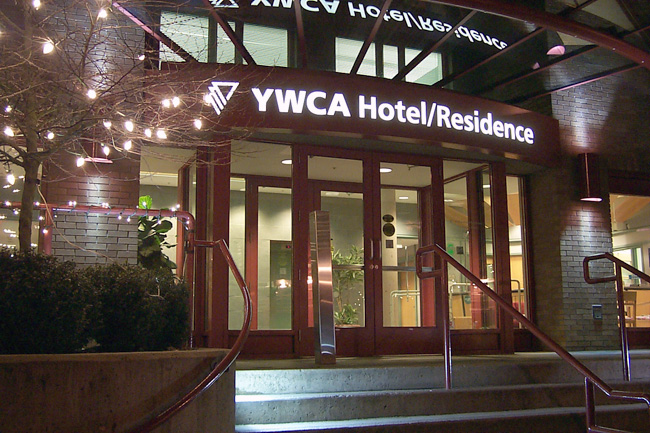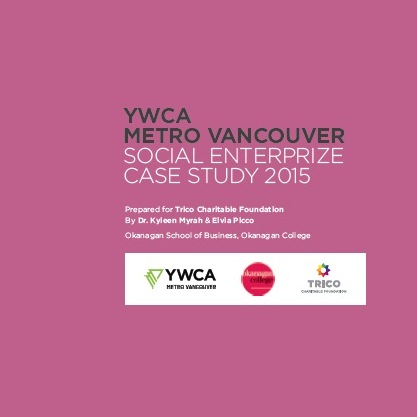This article was originally published on November 11th, 2015 on the Social Finance website. It has been cross-posted with permission from the author Karen Gomez, Associate, Social Innovation Generation (SIG).

SocialFinance.ca is thrilled to partner with Trico Charitable Foundation to provide a deep dive into the 2013 Social EnterPrize award recipients from the perspective of social entrepreneurs or individuals working in the social entrepreneurship environment. The Social EnterPrize awards seek to celebrate the best and the brightest social entrepreneurs in the Canadian context. This year’s awards will be announced and presented at the 2015 Social Finance Forum. YWCA is one of the four 2013 SocialEnterprize award recipients. This post provides a deep dive into the YWCA Metro Vancouver, Hotel/Residence case study. Please refer to introduction blog post for more details.
Most new businesses don’t make it to their first year, but the YWCA Metro Vancouver, Hotel/Residence has been around for over 20 years playing the hard balance between serving customers and supporting those in the community in need of short-term housing. Through an incredible symbiotic and strategic relationship with its parent organization, the YWCA Metro Vancouver, has served women and children for 117. They have achieved this through advocacy, integrated services, and housing that fosters economic independence, wellness and equal opportunities.
The YWCA Hotel/Residence has evolved into a deeply complex enterprise that wrestles with difficult decisions every day, but continues to be a leader in the hospitality industry. Much can be learned from their success:
Don’t wait to take a stance
The YWCA Hotel/Residence has been a forward thinking enterprise, committing to environmental sustainability far before it was an industry norm. Similarly, it was one of the first hotels to implement a non-smoking hotel policy.

Balancing social and business discipline
As a social enterprise, you must balance your social mission with your business strategy and have the discipline to pursue both. The YWCA Hotel/Residence is in the unique position of helping those in urgent need of short-term housing, but if it hopes to continue helping the community they must focus on revenue management. They have made a point to learn from the best practices of social enterprises in Canada and in the world, especially around investing in staff development. Their focus on revenue management saves the organization from needing to take full advantage on economic opportunities to maximize their profit. For example, while it was lucrative to inflate hotel fees given the increase in demand during the 2010 Vancouver Olympics, this could have jeopardized the amount of rooms reserved for clients with social needs.
People are key
The YWCA Hotel/Residence realized early on the importance of people. When the Vancouver economy declined in 2013, revenues took a big downturn. Rather than letting go of people, management provided hotel staff with professional development and training to ensure the implementation of the best customer service techniques. Staff were keenly aware that anticipated funding for programing was at stake and took pride in seeing the impact of the YWCA Hotel/Residence everyday. Staff are the reason why the marketing budget has stayed at roughly $60,000. Staff engage guests on the social impact and mandate of the hotel and encourage guests to recommend the hotel and write reviews if they enjoyed their stay.
Open, but cautious of growth and opportunities
Being able to serve the community is entirely dependent on being a successful business, which means that taking a business risk could jeopardize the social mission, which is why YWCA Metro Vancouver has been very cautious to evaluate any possibility of expansion. It has rejected several proposals because the risk just couldn’t be justified under the market conditions at the time or the potential returns.
Never changing, but never staying the same
Their values at their core remains the same. In 1904 the mission of the facility was to provide affordable accommodations for travellers and longer-term residents, as well as offer an important source of emergency and temporary housing for people in need. With time, the needs of the clients they serve have changed and the hotel continues to adapt and explore ways in which it can best serve its customers and maximize its impact.
Commercially, the hospitality industry has changed tremendously since the facility opened its doors and they have adjusted their business practices accordingly. For example, thorough renovations and promotion efforts they have changed the perception of the facility as a hostel and embedded social impact prominently in their brand. With time, they have learned their limitations, recognizing the residence is an emergency short-term solution and they have few supports available for highly specialized cases. This means that they must spend a lot of money educating other service providers on how to pre-assess potential clients before doing a referral – a hard lesson learned after they sent brochures to 20 agencies and were overflowed with referrals.
Ultimately, the YWCA Hotel/Residence is a testament of how visionary leadership can drastically change an organization and allow for financial sustainability – a model that didn’t exist 20 years ago when they first embarked on this journey. In what initially may have seemed like a contradictory mission, the YWCA has become a commercial success and achieved a strong social impact within the community.

